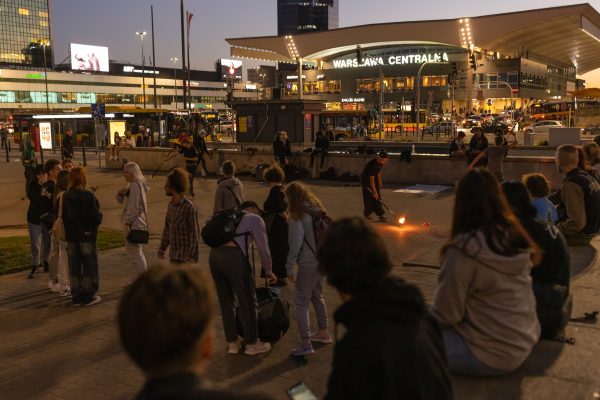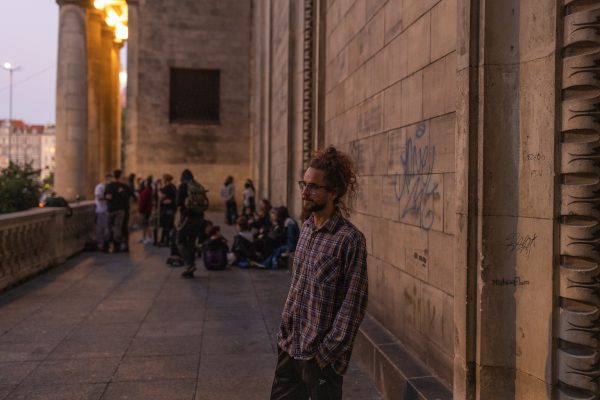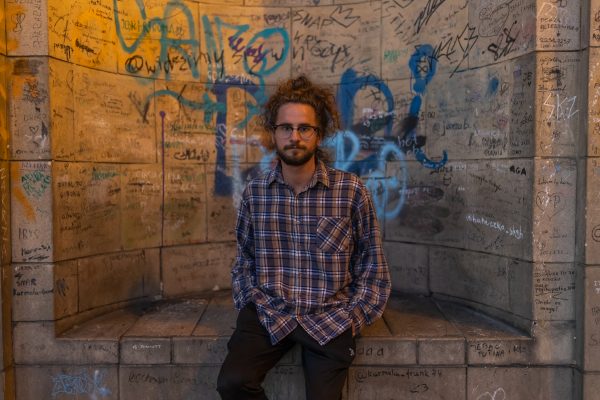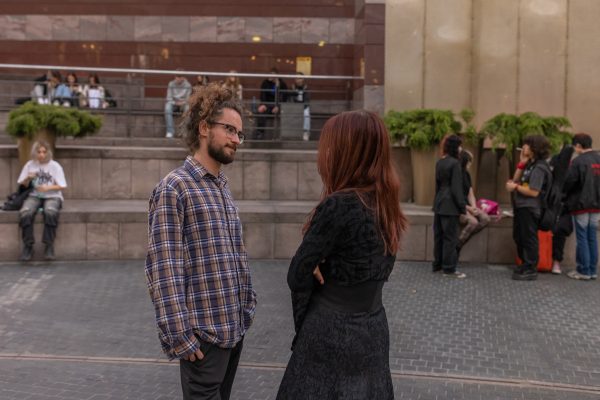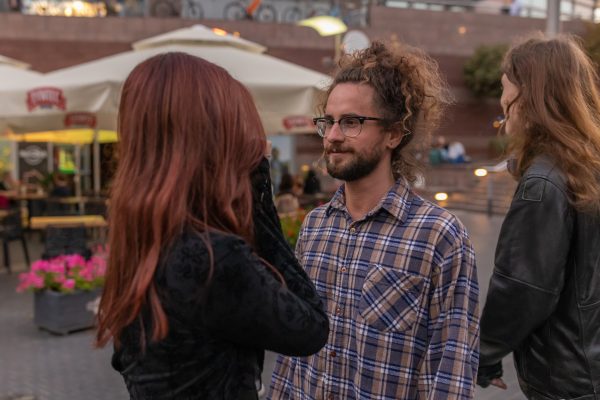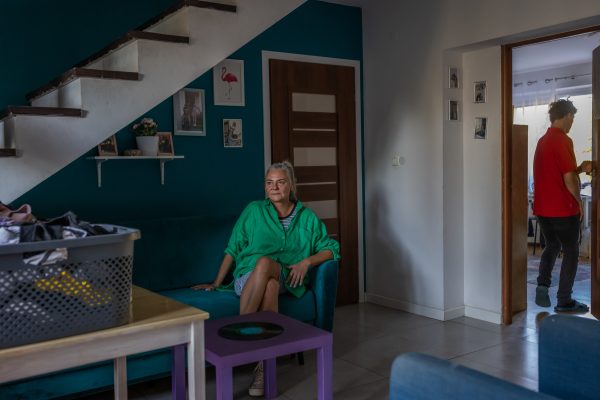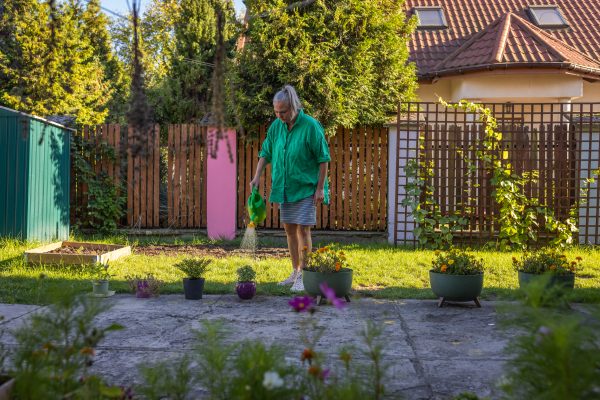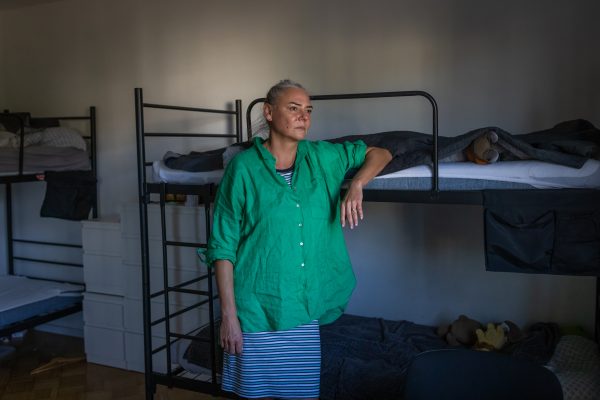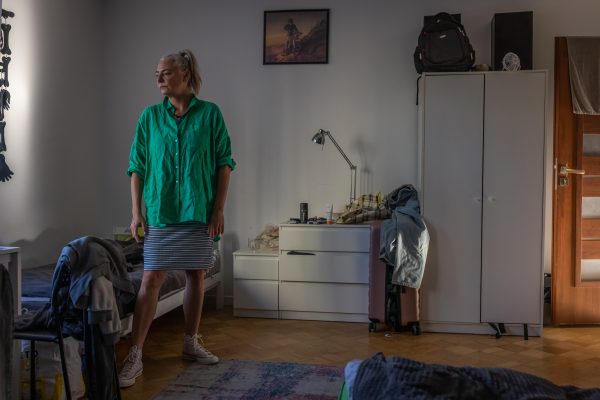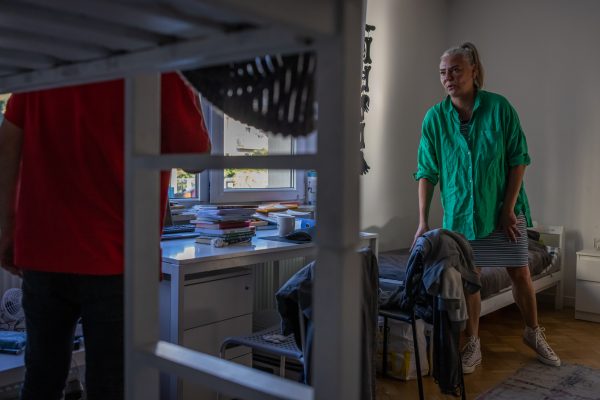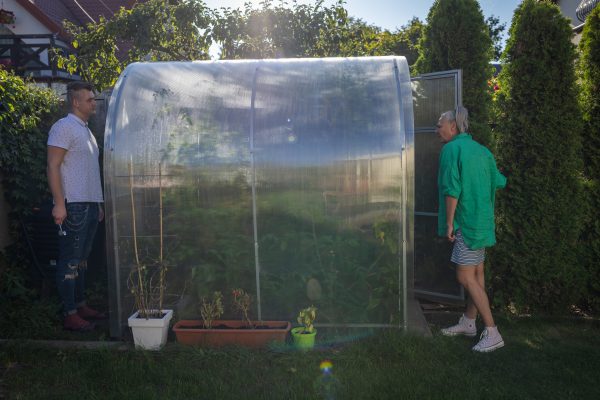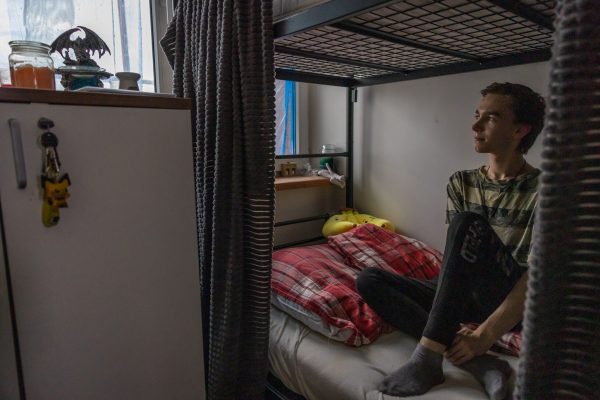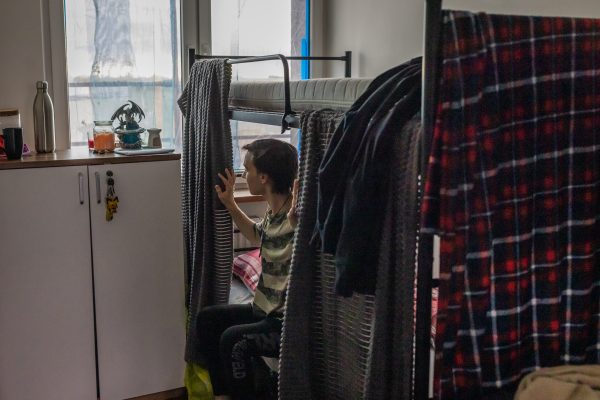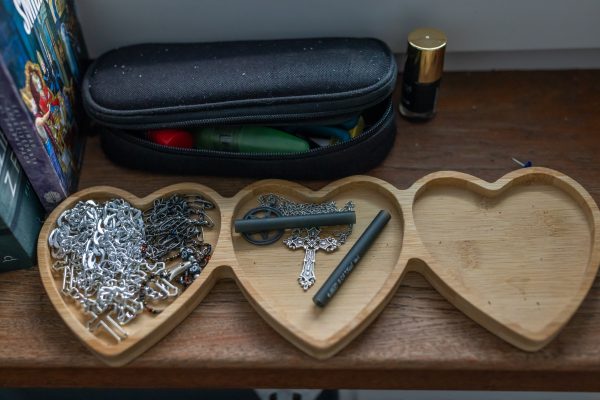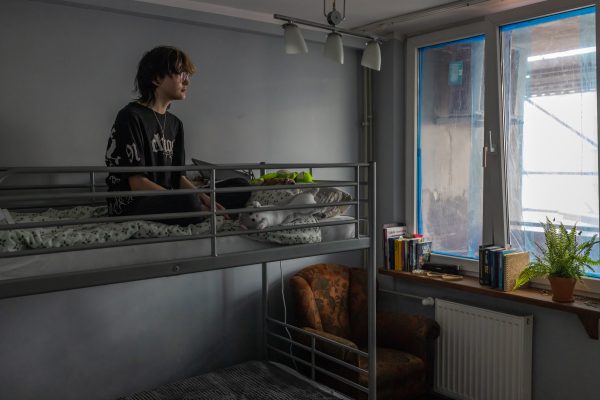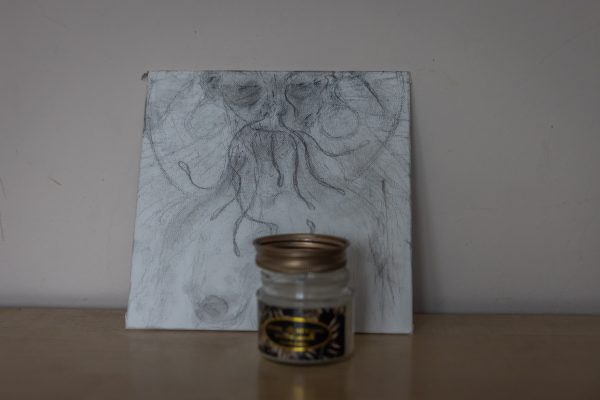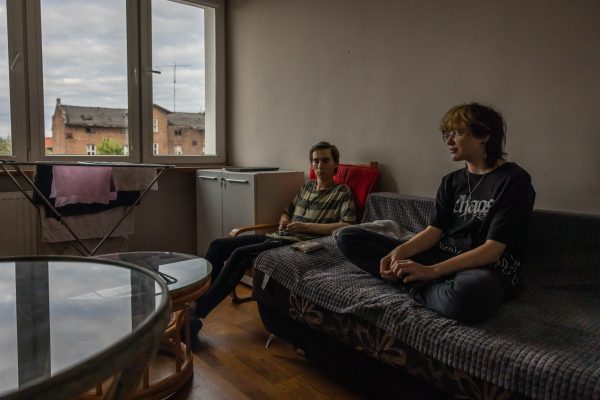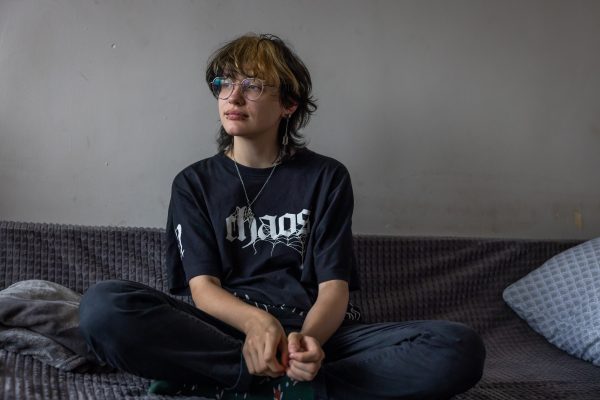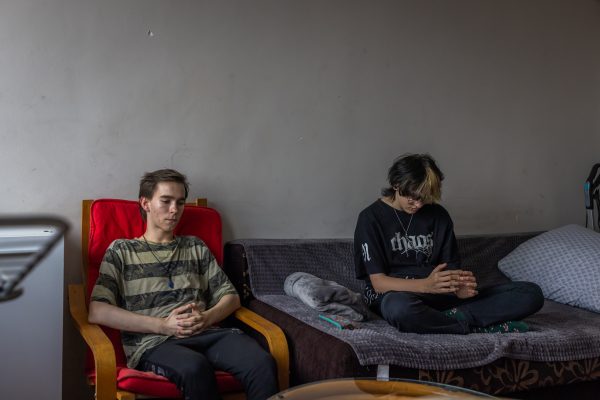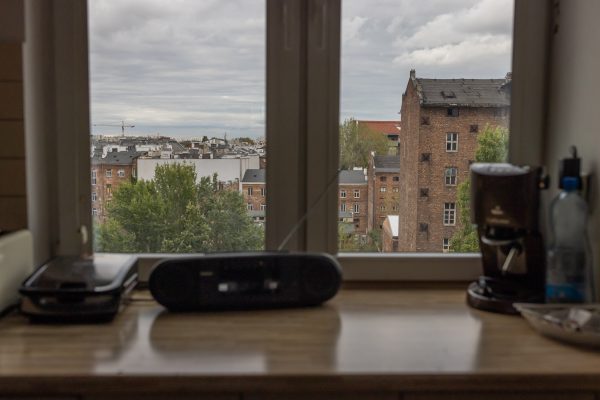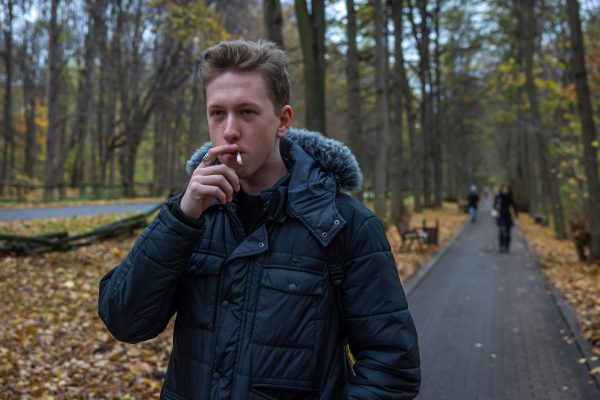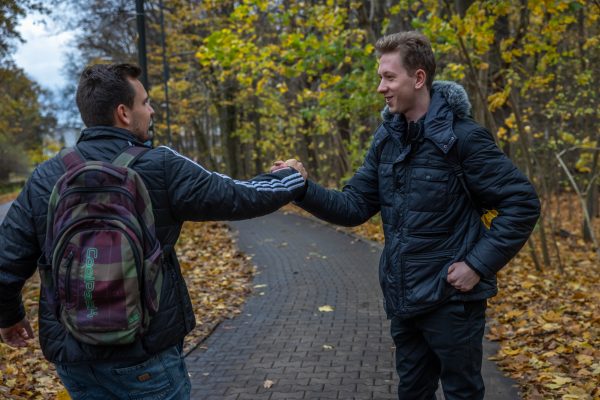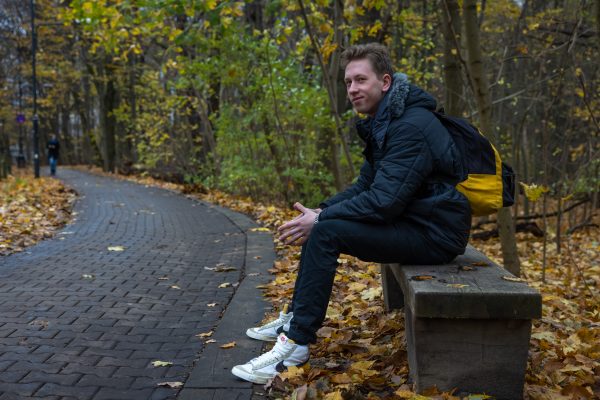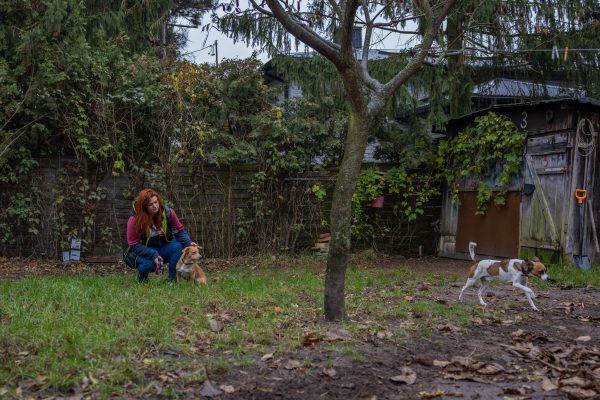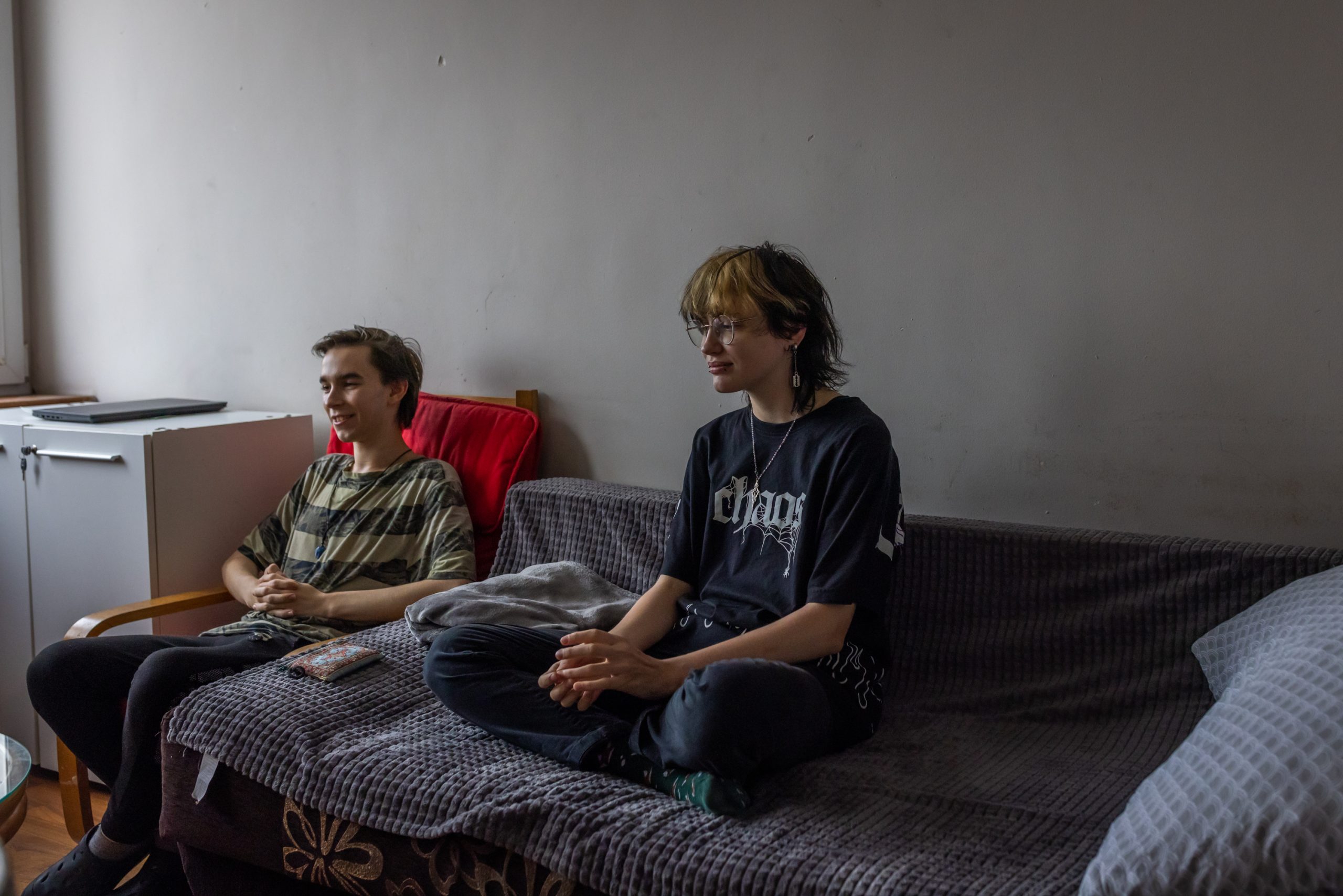
Often, young people who are homeless are invisible. They wear fashionable clothes, the girls have make-up on, and are constantly on the phone. An increasing number of them have a home, and even have their own room, but their parents are unable to deal with them. This is truly horrifying, because it reveals the grave state of the family in Poland – says Agnieszka Sikora of the Secondly Foundation.
Like dominoes in a row
Today Artur was able to sleep in, because he is doing the late shift. When he does the early shift, he has to be at Biedronka at 5.45. He set his alarm for 9.00, but when it went off he put his head down for a while longer. He was on his computer until late the night before, chatting with friends from his secondary school, and those conversations – about life and about gaming – are the most important thing to him. His friendship with Kuba and Grzesiu has been the only constant in his life in the last few years. – I owe them a lot, for standing by me and not breaking off the friendship when that all happened – he says, rubbing his fingers through his short, cropped hair – although I didn’t talk to them, when there was a desperate rush for shelter, they were very supportive, and I always look forward to our conversations.
While he was still at upper-secondary school, things were good. – We lived in a house on our own land in Warsaw, my mum had her partner, and they were getting on well. He was earning money, and was a bit like a dad to me; my dad ceased being part of our lives long ago. My mum took care of the home – Artur says.
Then everything began to fall apart, toppling like dominoes in a row. Artur’s mum started drinking, and this would make her fight with her partner, until he eventually moved out. His mum didn’t have a job, and so they didn’t have any money to live on, or for fuel for the heating in the winter. They had to walk one kilometre to get water from the public water tap when the pipes on their land froze. His mum’s ex-partner cut off their electricity. They would sleep in their overcoats, but it was cold all the same, and they stuck it out until the spring, when they ended up at the Ursynów Emergency Assistance Centre, where they were allocated a flat, but only for a time. After that it was a hostel run by the Community Aid Association, which helped the homeless. – Mum didn’t feel comfortable there, and in addition I don’t think she understood the situation we were in, that we had no home, we didn’t have anything, but we weren’t living on the street. She was incapable of appreciating that; she would drink, and one time she got severely drunk, and the hostel director ordered her to leave.
Artur was allowed to stay another week. Someone in the organisation that ran the hostel gave him the details of the Secondly Foundation, which helped young people (aged 18-25) who were homeless. He was placed in a home that the foundation ran for people in that situation, and from there he went to the training residence where we are right now.
– It has been almost a year – Artur says – it has gone by so quickly. – I have busy days, maybe that is why. I have work, and after work I try to keep up school. I have enrolled at a sixth-form college, where I study part-time and have meetings every two weeks, and I am also working to improve personally. When I went to the foundation’s psychologist for counselling, I realised that I can’t lead my mum through life. I need to take care of myself. She made me understand that what my mum is doing is wrong, that it is not my fault, because at first I blamed myself, thinking that there was more I could do, that I could help more, but I couldn’t. A parent is supposed to take care of you, and not you them. I realised that it was all right to be angry with her.
Well hidden
Of slight build, in a striped T-shirt and sports trousers, Artur is twenty years old. When I look at him, he does not resemble in the least the stereotype of homeless people I have in my head. That stereotype is strong, and is more or less a middle-aged man of scruffy appearance in dirty clothes, often smelling of alcohol and as if he has not had a wash for a long time.
Secondly Foundation president Agnieszka Sikora explains to me why this group is not included in the public’s idea of homelessness. The answer is that it has been invisible for years. The system does not detect people like this, and even staff at overnight accommodation or shelters do not feel that this is a significant problem. The perception is that there are isolated cases of young people being homeless. Moreover, research into homelessness conducted for many years confirmed this idea. – In the most recent survey, conducted in 2019, there were found to be 784 people aged 18 – 25 in that situation for the whole of Poland – Agnieszka Sikora – and what is 800 people when considered on a nationwide scale? Except that this is not true.
We are sitting in her office at the Secondly Foundation in Powiśle. Although it is evidently an office – with a large desk, computer, and binders on the shelves, it is cosy here and a little homely, like the foundation’s entire office. This is important, because it is usually the first place where young people find themselves when they seek help here. In the foundation head’s office there is a small coffee table and chairs to sit on, and ceramic cups. A portrait of Agnieszka Sikora hangs on the wall – to commemorate being named Warsaw Woman of the Year two years ago. For being active for ten years.
When she founded the Secondly Foundation with Ireneusz Stawiński and Andrzej Martuszewicz twelve years ago, they had no idea that they would be working with young people who were homeless. Their intention was to help young people leaving rehabilitation centres, but it transpired quite quickly that the main problem of people of this kind was that they had nowhere to go.
– In Poland, protected residences started opening for young people leaving care, i.e. an orphanage or foster care – Agnieszka Sikora explains – but these were schemes intended for better behaved and focused young people, and not for young people leaving rehabilitation centres. Next, we noticed that there was another group of young people who had never received help from the welfare system, but also found themselves homeless because they were unable to stay at home, that being a home in name only, in which there was abuse, alcohol, and various evils. Over time, we met an increasing number of young people facing homelessness, with a range of diverse stories to tell. Many of them were skilled in remaining unnoticed, and at first glance were no different to their peers.
The foundation opened a house and training residences for these young people, where they could live and learn to be independent, while being observed by carers. At the same time, the founders wanted to explore further and systematise knowledge about homelessness among young people, and this idea was the inspiration for the report on Homelessness among young people and young adults in Poland This year, the report was produced by a group of academics from the University of Łódź and University of Rzeszów, due to the funding that the foundation was given for the project Add me, from the Active Citizens Fund – National Programme (run using EEA and Norwegian funds). – the document draws on our experience and the experience of others who work with young people in various places throughout Poland. It is also a collection of the experiences of the young people themselves – Sikora says. – I think that this is an excellent starting point for a discussion on this subject and the first step to begin to deal with the problem of homelessness of young people in a more holistic manner, but also to look for partners and sponsors for the measures we are undertaking.
You don’t live here any more
The residence has the appearance of student lodgings. Two rooms, each with bunk beds, a small bathroom and kitchen with beige cupboards connected to the common area, in which there is a couch, television, and table. This is the seventh floor, with a beautiful view from the window – on one side over the roofs of the old Praga tenements, and on the other the Warsaw city beyond the river, with the Palace of Culture and skyscrapers. Artur lives on his own, in one room. He has put a checked blanket on his bed to make a curtain, so that he can have a private space. In the corner there is a desk on which there is a computer that he uses to talk to his mates, and next to that a wrapped-up keyboard – which he is very keen to learn to play. The other room is used by Benio and Florek.
It is conspicuously clean here.
– It wasn’t like this when I moved in – Artur says. – I immediately bought cleaning materials and started to work on that, and I think that inspired the guy who was living here at the time, and he joined in with the cleaning. That guy moved out and Florek and Benio moved in, and now all three of us take care of that.
Keeping the place tidy is one of the rules that the young occupants have to obey, and the others are that no drinking or use of drugs is allowed, rent is PLN 700 per person, and efforts have to be made to improve their situation. What is meant by that?
– That is a very individual thing – one person starts going to therapy, another continues their studies, and someone else finds gainful employment, but we definitely want to drum into young people that the best solution for them is work, work, and more work. This is working on oneself, and work that generates a means to live. It is not enough to live in the training residence and take showers – Agnieszka Sikora explains.
The Secondly Foundation, of which she is head, has six training residences in Warsaw, each with a carer who drops in a few times a week to check whether the rules are being obeyed, but also to provide the young people with support in overcoming their troubles and the crisis they found themselves in. – They need someone adult to take an interest in them and take care of them, because they are very young and sorely deprived – Agnieszka Sikora stresses.
The residence used by Artur, Florek and Benio is unusual because it can be used by people from all over Poland. The other four, which are funded by the Warsaw municipal authority, can only be used by people from Warsaw, and one is for people from Ukraine. This is another in a series of measures taken by the Secondly Foundation as part of the Add me project.
This is how shelter was provided for Florian, who is from Radom, and for Benio, who grew up outside of Garwolin.
– I would furnish this residence differently, and completely refurbish it – Florek says, and is the first to smile gently when we meet. The tall, slim Florian is an artistic soul. He is dressed in black, with a few strands of his dark, shoulder-length hair dyed blond above his forehead. He wears a metal necklace and a lip ring, and loves drawing. – but I am tremendously grateful to be able to be here, and that I have somewhere to live, because I wouldn’t otherwise. I can’t expect any help from my family, and this is a calm place where there is no stress. I know that I have somewhere to stay, and that enables me to function normally.
Florian is not very talkative, and does not like to talk about himself or in general, but he does say a few things. He was born in a very wealthy family, and they lived in a detached house. His father had his own business, but he began to drink, and when he did, he would abuse his mum mentally, and she left with three children when Florek was almost seven years old. From that time, they lived in an apartment block, with the spectre of the past looming over them. Florek was sensitive, and could not find his place among his peers. He gained a little self-confidence when he was accepted to go to art school, but he failed the second year due to depression, and had to leave. This is a story of self-mutilation, and time in a social therapy centre and psychiatric hospital. In addition, his mum decided that once he had left home and reached eighteen, he could not return home, because she didn’t know what else she could do to help her child. Florek stayed with friends for a while – for a week in Mokotów, and a week in Mińsk Mazowiecki, until someone gave him the address of the Secondly Foundation.
The foundation’s Agnieszka Sikora stresses that increasingly often it is young people that come to them, and they are not necessarily from “broken homes”, where the parents drink, do not work, get into trouble with the law, and are on welfare. – These are kids that have a home, and even have their own room at home, whose parents work but are unable to deal with their own child. In some cases, they desperately spend years seeking various solutions, going from one psychologist and psychiatrist to the next, without success – Agnieszka Sikora says. – and those parents have given up. Sometimes, they are very glad that their son or daughter has found us, because that restores their hope that finally someone will mend their children. This is truly horrifying, because it reveals the grave state of the family in Poland. Of course this is also due to mental health problems, which has been much talked about recently. In addition, a large portion of young people who face homelessness are LGBTQ+.
A quest
– So what do you think of this place? – Kacper asks, and we quickly start using the familiar form of address when talking to him. I was surprised because after all I know this place really well. This is the route I take to Cafe Kulturalna and Teatr Dramatyczny, and I come through here on the way to Kinoteka, the Central Station, and Złote Tarasy. This is right in the centre of Warsaw, the heart of the capital. – Exactly – Kacper says – but I see something more here, people in need of help. I often wonder how it is that here people have lives in which they are doing well and are content with themselves, while right next to them a drama is unfolding.
Kacper is a Secondly Foundation streetworker. We are walking around the Palace of Culture, which is where he does the most patrols, and he says that when he does that he takes a different perspective. Under the surface of the fast, metropolitan life, he sees the other life that exists here. The life of people who are on the edge of a precipice for various reasons – sometimes they have nowhere to stay, sometimes nothing to eat, and sometimes they simply need someone to talk to about dilemmas and decisions in life, to give them support. The large square that surrounds the Palace of Culture on four sides, the frying pan, which is the small square next to the entrance to the Centrum metro station, the steps next to Złote Tarasy, and ulica Chmielna, are places where young people and adolescents facing homelessness congregate.
Kacper is 27 years old, is studying education, and is a teacher at a primary school community centre. He is slim, has long curly hair tied in a bun, and is casually dressed. He listens carefully and speaks in a calm, soft voice. He did internships at the Secondly Foundation, and then training, with ten or more other people, to be a streetworker.
– This was something completely innovative for us – says Agnieszka Sikora about the training – and creating a peer-to-peer streetworker group was a huge challenge. The idea was that these would be people of a similar age to those we help, who had experienced homelessness themselves or faced the prospect of homelessness, but managed to overcome those problems. Their experience and perspective is invaluable, because it gives them a better understanding of certain situations and makes it easier for them to talk to young people. They have been active on the streets of Warsaw since April this year, and through them a number of people have now come to the foundation.
– When we go on patrol we go on a quest to find someone who might need help in a broad range of forms – says Ola, stroking Korek and Marcel, two mixed-breed Terriers circling our feet. I am visiting her at a house just outside of Warsaw, where she was immobilised with a broken leg a month ago. – Or in other words we go out to provide a service. Olga gives me a list – the foundation can provide a psychologist, career adviser, training residences, a house for young people, and legal aid. – Young people can pop in to the main office, have a sandwich, choose some clothes for themselves, and use a computer to look for a job.
– the important thing is that we are the second, third, and fourth option. Even if someone has been helped by our foundation but something has gone wrong and they are on the street again, they can come back to us and will be given support – Kacper emphasises.
– how do they recognise people in need? They differ a lot, and each one has their story – Kacper says. – Many wear fashionable clothes, have make-up on, and are constantly on the phone, but I try to look beyond those cool clothes to see their needs and scars – both mental and physical – due to self-mutilation. I pay attention when there is a recurring facial expression, a certain posture, and sometimes when someone is loud, as if they constantly need to draw attention to themselves. Often, a person in need of help will maintain eye contact with me for a longer time. They don’t have to say anything, because I can tell that something is wrong. Sometimes you get chatting to someone five times and it is not until the sixth time that there is a breakthrough, sometimes they will surprise you the first time you make contact, and sometimes it is enough to talk to someone. Let’s take this scenario. Two girls who looked around sixteen came up to us recently when we were on patrol to ask if we could sell them drugs. We reply that we are not selling anything, but I start talking to them, and ask why they are looking for that, and what the matter is. After an hour of conversation they say we’re going home and now we’re not going to buy anything. What is very important is the right moment, when someone wants to change something in their life, you have to be alert to detect that.
– We never say to people we talk to something like I am the hero, and I have come to save you – Ola emphasises. – We extend a helping hand and give these people a chance to save themselves, and that is because if something is to come of it, they have to make the effort and be open to changing their life.
– It would be much harder for us to navigate all this without training – Ola and Kacper agree. The training included classes with experienced streetworkers, psychologists and a sexologist, and on first aid, but also lessons on staying safe when on patrol (streetworkers always walk around in twos) and on locations around the city of organisations to which a person who needs help can be referred according to their current needs.
– I also gained a lot personally from the training. A lot of things fell into place due to that training – Ola adds. – I had difficult experiences of my own, which I don’t want to talk about here, but it was hard. I have been working on it, going to therapy for two and a half years. I tell my story to the people we help, and that helps to forge something good. There was a time when I felt invisible and I did not think that I had anything to offer others. Taking part in this project helped me to come out of my shell and expand myself to realise others’ needs. That enriches me.
I ask her about the tattoo on her chest, it is distinct, but also subtle. It shows half of the moon merged with half of the sun, with letters written in a strange alphabet. – It’s a quote from Tolkien – she explains – one of my favourite books, and it means darkness must pass, and a new day will come! I had it done recently.
Compliment
Benio demonstrates a cup won in the nationwide Shorin Ryu karate championships, which stands on the cupboard in his and Florek’s room. He won first place in 2019. He takes out his phone and puts on videos that he recorded together with his brother and sister, and then edited himself. He is dressed in a karate suit and showing his skills on the videos, to music. He is excellent.
– I lost two years of training due to everything that happened – he says. – When I went back to training, Sensei asked me how I could ruin my body so much.
Alcohol and drugs were his way of dealing with sadness and stress. When he was fourteen, his mum became ill and died. His dad moved aside, and so his grandmother took care of Beniamin and his five siblings. They lived together in an area of just under forty metres. When his girlfriend broke up with him before the matriculation examination, it became too much. He started using alcohol and other substances. – I am ashamed to admit it, but I was hungover when I went to take the exam – he continues. – but I passed and went to the Netherlands. I came back to my grandma’s house one month later, when it happened to be my nineteenth birthday. I was high on various substances that are readily available there, and did a few stupid things. I got to the point when I no longer cared.
He could be said to be lucky. Since his mother had died, the family was in the care of a coordinator from the District Family Aid Centre. She convinced Benio to go to rehabilitation therapy and then to a psychiatrist for more treatment. – I was there for four months and it’s a painful memory – he says, and reaches for a large cup containing tea, a cup that he brought from his grandma’s house specially, because he doesn’t like constantly having to make new tea. – When I left, the coordinator went with me to the Secondly Foundation. I was told there that the next day, that was New Year’s Day 2023, I could go to live in a house for young people operated by the foundation, but before I went to register, something made me have a little drink, thinking that it was nothing. There are strict rules about not drinking at the house, and when they smelt alcohol on my breath they told me to sober up and come back the next day.
He tried to sleep at Warsaw Central Station, but security threw him out, and then on a bench, but it was too cold. Eventually his elder brother found him a cheap hotel for one night, but that brush with homelessness had made an impression. The next day, after a good sleep and a shower, I went to the foundation, and since then I have been very careful to stay sober. He stayed at the house for young people run by the Secondly Foundation for six months. Carers are with the young people at the house twenty-four hours a day. In June he moved to the foundation’s training residence.
– having somewhere to stay, watch films on my laptop, and make myself dinner, enabled me to get myself sorted out. I have a job – cleaning at a fast-food restaurant, and in October I started cultural studies at the Cardinal Stefan Wyszyński University in Warsaw. I am interested in culture, sociology, and philosophy, my mum was a cultural anthropologist – he says, and holds his face in his hands. Beniamin is twenty years old. He is tall and blond and dressed in a top that is a perfect white with the slogan Chicago on it, and black trousers. He has thick, silver, engraved rings on his fingers, and has a calm, soft voice. – I went back to doing karate. I really enjoy that – it teaches discipline and respect, it is an entire philosophy. I would really like to go on a winter training camp in Bieszczady, the way I used to. Sensei told me recently that I’m getting my speed back. To get a compliment like that from Sensei really means something.
The Foundationj for the second’s project “Add me” was carried out using a grant under the Active Citizens Fund – National Programme funded by Iceland, Liechtenstein and Norway using EEA grants.
Text: Agnieszka Wójcińska
Photos: Anna Liminowicz
The report was published on Onet.pl
